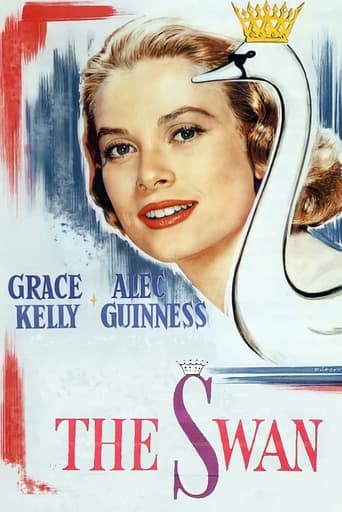


The Swan
Princess Beatrice's days of enjoying the regal life are numbered unless her only daughter, Princess Alexandra, makes a good impression on a distant cousin when he pays a surprise visit to their palace. Prince Albert has searched all over Europe for a bride and he's bored by the whole courtship routine. He is more interested in the estate's dairy than Alexandra's rose garden. And then he starts playing football with the tutor and Alexandra's brothers. Invite the tutor to the ball that night and watch how gracefully Alexandra dances with him.
-
- Cast:
- Grace Kelly , Alec Guinness , Louis Jourdan , Agnes Moorehead , Jessie Royce Landis , Brian Aherne , Leo G. Carroll


Similar titles
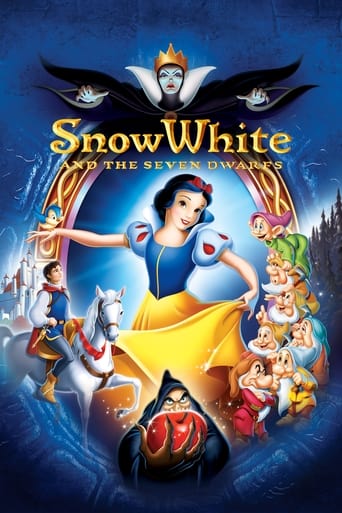
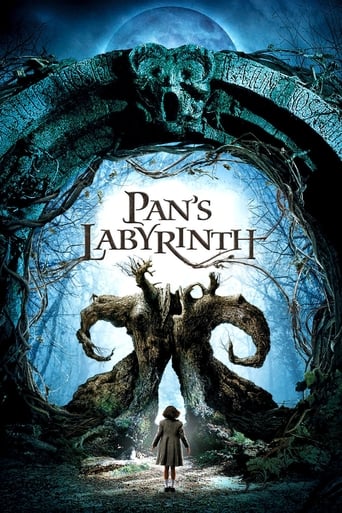
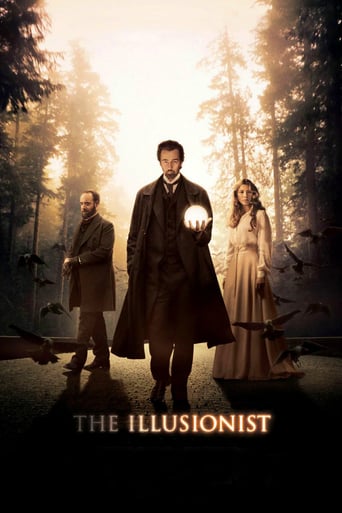

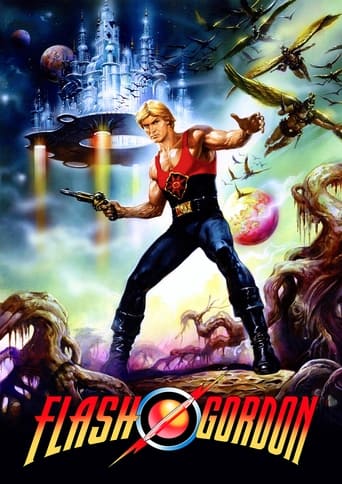
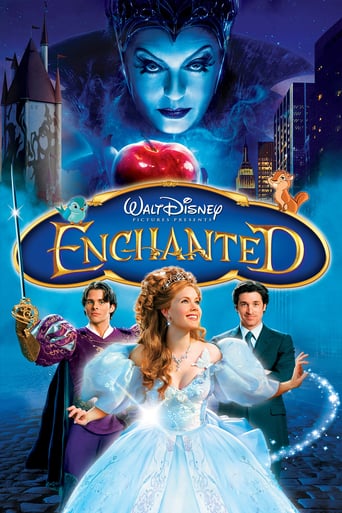
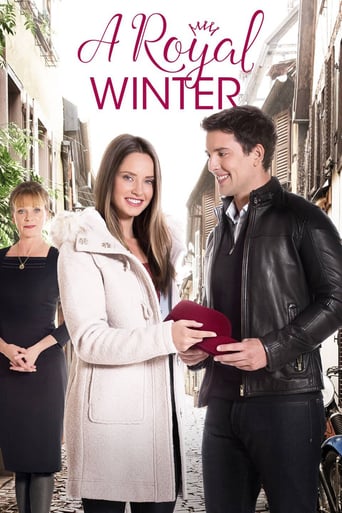
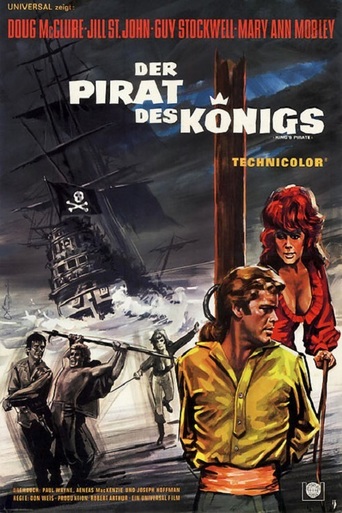
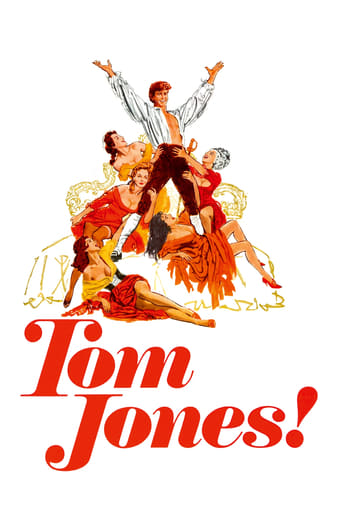
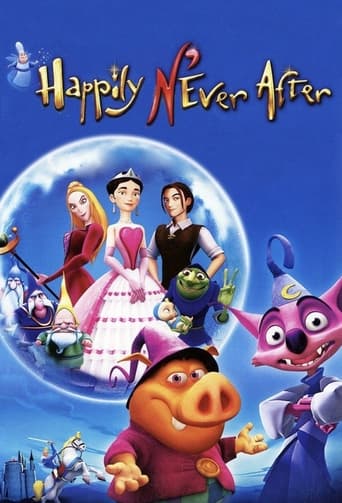
Reviews
Powerful
Boring
A Disappointing Continuation
This is a small, humorous movie in some ways, but it has a huge heart. What a nice experience.
Directed by Charles Vidor, with a screenplay by John Dighton (Roman Holiday (1953)), this average romantic drama with comedic elements stars Grace Kelly (The Country Girl (1954)), in the title role, as a Princess who hopes to (marry to) become a Queen. Ironically, production on this film was wrapped up (at the Biltmore House in North Carolina) just before Christmas, when Prince Rainier of Monaco, who had been corresponding with the actress since they'd met at the Cannes Film Festival (quite by chance, sometime earlier), visited her in Philadelphia, beginning his courtship which will culminate in their royal wedding.Kelly plays Princess Alexandra, a blonde icicle of a woman whose mother Princess Beatrix (Jessie Royce Landis, who also played Kelly's mother in To Catch A Thief (1955)) has prepared her for, and dreamed of, the day when their family could be reunited with the crown through marriage to Prince Albert, played wittingly as always by (now, Sir) Alec Guinness. So, in effect, Albert is the fish that Beatrix wants to "hook" for her willing daughter Alexandra, who's convinced to use her admiring "friend", and younger brothers' (Van Dyke Parks and Christopher Cook) tutor, Dr. Nicholas Agi (Louis Jourdan), to make the Prince jealous enough to show an interest in her. A problem arises when Agi, who'd lit an improbable candle for Alexandra, reads too much into her inviting him to the ball for the Prince, such that he believes he can miraculously rise above his class.Agnes Moorehead plays Albert's mom, the Queen, who appears briefly near the end of the film. Brian Aherne (Juarez (1939)) plays Beatrix's brother, now Father Hyacinth, whose insight and wise guidance proves invaluable to their "side" of the family. A nearly unrecognizable Leo G. Carroll plays Caesar, the subtle and all knowing family butler. Estelle Winwood plays Beatrix's older sister, and Alexandra's Aunt Symphorosa, who's facial expressions and "gasps" as well as her championing of Jourdan's character in the "love triangle" highlights several of the film's too few amusing scenes. Robert Coote plays Albert's ever present aide, Captain Wunderlich, whose valuable services allow the Prince to appear to be more in touch than he actually is; the Captain also "rescues" Albert from uncomfortable or otherwise boring situations. These "interventions" provide the balance of the remaining "funny" scenes.Besides the confusing and rather frustrating romantic triangle interactions that dominate the film's final third, the ending itself is especially downbeat, as are many of these "stiff upper lip", "one must not forget one's duty" royalty pictures ... though we do, finally, get an explanation for the film's title.
"The Swan" is in that relatively small niche of films in which duty or honor trump love.Obvious examples of the duty/honor-trump-love genre include "Roman Holiday," "The Prisoner of Zenda," "Casablanca," "The Man Who Shot Liberty Valence," "Shakespeare in Love," "Interstellar," (arguably) "Camelot," and some superhero stories (especially Superman). If you like these movies, you will probably like "The Swan." (OK, I'm not too fond of the molasses "Camelot," but I do like the others.)Here is Why:(Skip down to the next section if you're not into movie pedantry – I couldn't resist :-).This genre involves a triangle consisting of at least one worthy hero, a worthy heroine, a clear duty, and a tension involving that duty and love between the hero and heroine. However, the hero or the heroine ends up yielding to the duty rather than seizing the love (a variant is "Liberty Valence," where, instead, perhaps the heroine does not end up with the hero she should). The hero/heroine love need not be romantic, e.g., "Interstellar" involves father- daughter love.Frequently, a fourth element is added in the form of a second, less sympathetic, suitor for the heroine, forming a more traditional romantic triangle. The second suitor is usually the proxy of the duty, i.e., the duty requires the heroine to choose the second suitor. ("The Swan" falls into this case.)Also typically, the hero makes the noble decision to not take the prize of the heroine (exceptions include "Roman Holiday," where the heroine makes the decision, "Shakespeare in Love," where the Queen commands it, and "Liberty Valence" where the John Wayne character makes the decision). The great cause requiring the noble sacrifice can be family honor (as in "The Swan"), patriotism, humanity, or religion, among others.To be clear, there are many tragic themes that do not fall into the duty/honor-trump love genre. These other themes are often sorrowful, but just not do carry the same emotional undertones. Hence, I do not include happy-ending duty/honor-vs-love stories such as "The Four Feathers;" death-for-love sacrifice stories, such as "Titanic," "A Star is Born," "A Tale of Two Cities," or "Five Graves to Cairo," (a relatively common theme); other sacrificial stories such as "Gypsy;" or sacrificial subplots within stories, of which there are gazillions (think "Gone With the Wind" or many war films). I also discard deferred-gratification-with-hope stories such as "The Prince and the Showgirl" or "Hollywood Canteen." Further, the genre is exactly the opposite of love-trumps-duty stories such as "Romeo and Juliet" and its dozens of derivatives, and "Love Story" and its many wrong-side-of-the-tracks variants, in which characters defy duty to obtain love, with the inference that the duty is improper or even offensive.Films in the duty/honor-trump-love category tend to have sad and somewhat ambiguous endings, and "The Swan" fits right into that mold. Truly great and memorable films in the duty/honor-trump-love genre tend to be high tension, powerfully emotional, passionate, moving, and intense, packing a demonstrative wallop and encouraging a wet eye or even a tear. Unfortunately, in this respect, "The Swan" disappoints. It does not drive the poignant punch of most of the examples above. The letdown in "The Swan" is certainly not due to the cast, the costumes, the pacing, or the sets, all of which are wonderfully first rate and make the film worth watching. Grace Kelly alone makes this film worthwhile. You will be entertained, you will be hopeful, you will be charmed -- but comes the placard that says "The End," you will be wondering if someone forgot the last reel.The problem is the story and script, in which the Grace Kelly character spends only a tiny sliver of the film falling, without much motivation, for the Louis Jourdan character. Contrast the significant amount of time "Roman Holiday" spends building the deep connection between the Audrey Hepburn and Gregory Peck characters. By the end of "Roman Holiday," the audience is so invested in the pair, that their sacrifice, while understandable, is nevertheless heartrending. Similarly, consider the number of scenes in "Casablanca" developing Humphrey Bogart's and Ingrid Bergman's characters. On the other hand, the love of Grace Kelly's princess with the Professor comes across more as shallow puppy love, a brief and contrived infatuation. The audience is simply not upset with the turn of events. The viewer observes the events from afar but does not live it.Footnote:BTW, when folks say "they don't make films like that anymore," they are correct about this genre. This category has become even rarer since the 1960s. (Ok, a few remakes here and there, and "Shakespeare in Love," and "Interstellar," and some "Superman" flicks, and a few others). The bulk of the offerings seem to originate in the 1920s through the 1940s.Perhaps this rarity can be explained either by notions of duty and honor being less strong or popular post-WWII, or maybe by "downer" movies not generating the required revenues. (I tend to lean towards the first explanation; "Titanic," "Shakespeare," and "Interstellar" demonstrate that sad and even tragic endings can be profitable.)A further observation is that movies in this genre are almost always period or other-world pieces, never in real modernity (with the possible exception of "Roman Holiday," and even that is fairy-tale flavored). The message is that this is the selfish "Me" generation, chivalry and nobility are dead, and nothing in 21st century western civilization can trump love. Even Superman comics have given in (though not yet the films – I predict they will). Simply, in our day and age, we are expected to have no duties, loyalties, or honor greater than love. Perhaps this is why, when we see modern sad films, they are usually "Romeo and Juliet" or "Love Story" or "Titanic" themed films.Watch this film – it is enjoyable, though not great, and its theme is less common than you think.
I can't give it the "awful" rating because it's beautiful filmed and all the acting is splendid. It's a gorgeous film, and it is simply awful. The woman has had no life of her own, she's been ruled by her mother, done what her mother demanded, and never let herself feel. Finally, the situation between the tutor and the Prince she is supposed to marry, becomes explosive and in that explosion she realizes her true feelings -- more than that: she realizes she HAS feelings. And of course she's a princess and she's going to marry the Prince, it doesn't matter who she loves. But that happens in Roman Holiday and the princess is going to feel it and love the man involved for the rest of her life. The ending of this film with Alec Guinness saying she's the swan gliding through life, having no feelings and he's the same, playing their roles. Oh god, it's horrible. How can anyone call that romantic???? It's a total denial of life.
More than Charles Boyer,Louis Jourdan was par excellence the French lover;he was so handsome that pairing him with supreme beauty Grace Kelly was only natural;Alec Guiness seems out of place next to this dream couple.It should be noted that Jourdan was never big in his native country where he made some interesting movies ("Premier Rendez-Vous" )but no memorable masterpiece :he was probably too handsome for his own good.Whereas France was asking for plebeian heroes (Jean Gabin) he was some kind of aristocratic person.But not in "the swan": he is a proletarian ,an educated proletarian (they always call him "the teacher" ,"the professor" and the princess learns his first name halfway through the movie) but a man of common birth . Which makes "the swan" a fairy tale in reverse : everyone knows his place (scene of the kiss) ,even the romantic gorgeous lady becomes sensible and reneges on her love."When a swan leaves his lake,he becomes gauche" ."A Star dragged down into the mud" .The aristocrats (particularly the ladies and even the clergy) are hard on the others.The story takes place at the beginning of the last century at a time a princess could not marry a peasant ;and today ,if they do not marry a noble ,they make sure he's got plenty of dough ;ditto for the princes.The movie became prophetic :Grace Kelly was so credible as a princess she became one in real life.Strong supporting cast :Jessica Royce Landis (who was also Kelly's mother in "to catch a thief"),Estelle Winwood and Agnes Moorehead .
